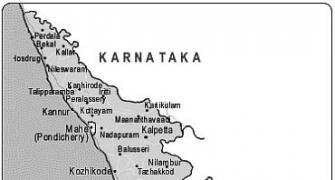 There have been no major blasts in the state, but most terror operatives are trained in camps in the state. Extremely volatile, Kerala has been declared a Red Zone by the NIA. Vicky Nanjappa reports
There have been no major blasts in the state, but most terror operatives are trained in camps in the state. Extremely volatile, Kerala has been declared a Red Zone by the NIA. Vicky Nanjappa reports
Kerala has been declared a Red Zone by the National Investigation Agency, which firmly believes that the state has become a hotbed for terror activities. Last week’s verdict where 13 accused, including suspected Lashkar-e-Tayiba operative T Naseer, were sentenced to life imprisonment for recruiting persons to fight the battle in Kashmir is a testimony that terror activities in Kerala have flourished.
An officer with the NIA told rediff.com that investigating terror in Kerala is a different ball game. “There is a massive presence of the Indian Mujahideen and the Students Islamic Movement of India here. The problem, however, is that they operate under micro modules and this makes tracking them even more difficult.”
The investigation agency also faces trouble from Hindu youths who have taken it upon themselves to dismantle these terror outfits. “Our fight is a continuous one with no end in sight,” an officer said.
According to the NIA, Kerala has been named a Red Zone since the atmosphere has become extremely volatile. “The state has not witnessed acts of terrorism like the rest of the states. But the situation in the state is extremely unpredictable.”
“There are small blasts and acts of violence. A series of meetings are held between terror outfits. And rivalry between religious groups only makes the situation worse,” an investigator added.
Terror modules operating in Kerala are on the police radar, but there are certain zones infected with militants, which even the local police do not dare enter. The Wagamon camp, considered to be the launch pad for the Indian Mujahideen, is a testimony of how terror activities are carried out in the open. The NIA, which is still probing this 2008 case, said that several such camps are being conducted in the state and its operatives manage to dodge the local police.
The NIA hinted that these terrorists enjoy political patronage and hence go about their jobs with ease. “Be it any major blast in the country -- the 2008 Gujarat blasts or the one at the Bangalore Chinnaswamy stadium in 2010 -- a Kerala link has always been established. The Bangalore blast was masterminded by T Nasir and he enjoyed the backing of Muslim leader Abdul Nasser Madani. Nasir carried out the attack on his own without any help from a major terrorist organisation. And there are many others like Nasir in Kerala,” said NIA officials.
The NIA has a long way to go before it gets cracking on these modules. The conviction in the 2008 Lashkar recruitment camp is just the beginning.
As an NIA officer pointed out, “These are not just cases pertaining to blasts or recruitment. Every other day there is an incident that is linked to terror groups.”
“The 2003 Maradi massacre that claimed nine lives has more to it. There was a demand for a CBI probe, but it was never granted. Instead a commission was set up in 2009. Its job was not easy. They established that the massacre was linked to the Indian Union Muslim League, but the probe could not be continued. This was due to the transfer of key officers in the case,” he added.
And there are may cases which have met a similar fate.
The investigation into the September 2005 blast in a shipping vessel at Beypore revealed that it was carried out by a “fanatic”. However, the probe has hit a dead end today. The fisherman, who was a witness to the case, retracted his statement. This case was handed over to the CBI, which failed to make any headway.
In 2009 a blast ripped through an office of the Eranakulam collectorate. It has been four years now and the police are hunting for clues. They suspect the involvement of SIMI. However, they are waiting to question SIMI man Manzar, who was arrested in March for involvement in the 2007 training camp at Wagamon and is currently being questioned by the NIA.
At Kuttiady, the police recovered maps and diagrams of pipe bombs. The police launched a massive probe in the case in 2008. However, the case still remains unresolved; the police are clueless.
Both officials in the NIA and the Intelligence Bureau said that these cases are a result of religious skirmishes. “When there is religion involved there is a vote bank and hence some local politicians jump into the fray to safeguard such operatives. These operatives who plan blasts recruit people to do other jobs during elections. They engineer communal riots in order to polarise votes,” the officers pointed out.
Image: Police teams at the Chinnaswamy stadium in Bangalore after the blast in 2010








